Holy flaming cows, Batman! with Jonathan Gems - Part 2 (of 3)
A refreshingly candid chat with the screenwriter & playwright about working with Tim Burton
Part 2 of my discussion with Jonathan Gems. If you haven’t read the first part, you can find it here.
A psycho for good.
A lot of people back then still thought Batman was just for kids, so some of the younger folks today might miss out on how great of a take making him psychotic was.
There are a lot of eccentric, basically mentally ill people who can still function in society.
I might be in that lot.
Are you now [laughter]?
I’m still on the fence about it [laughing].
I mean there’s rich aristocrats like this throughout English history especially… some of them want to muzzle cats, you know. But they’re rich or they have a castle and everybody humours them.
Keaton’s Bruce Wayne is peculiar, isn’t he? He doesn’t even introduce himself properly at his own party.
That’s right. You’ve got this wealthy guy who dresses in a bat suit and he’s got this Batcave, and he’s obviously disturbed. But with that you’ve got something for a movie… the protagonist and the antagonist and are equally interesting. I told Tim the other thing was that they had to make Vicki Vale interesting, and sexy, because in the script she was really boring. She was a bad copy of Lois Lane.
Was that because Superman: The Movie was such a success the studio figured they could just use the same formula?
Absolutely. I lived in L.A. for ten years, and I got to learn how they think. I thought they should do something more original, more innovative.
So, what happened with Tim’s lady friend who answered the door? Was she shriveling away in the corner dying of hunger?
Oh, yes, I forgot. She started asking for Chinese food [laughter].
But you guys had important Batman-y things going on.
Yes [laughter]. So, we left Tim’s flat and walked to the Imperial Garden restaurant on Kensington Church Street. I’d never been there before, but it looked kind of grandiose like the Forbidden City, and they wanted to go, so the three of us sat and ate. After dinner, we walked back to Tim’s and I had a Volkswagen Beetle at that time which I’d written all sorts of slogans on. I was one of the original sort of punks in London, and I still had that kind of attitude, and I had spray-painted all these aggressive things on the car.
Like what?
All sorts of mad things like, “The tigers of destruction are wiser than the horses of instruction.”
Hmm. Very poetic [laughing}.
The car was old and on its last legs anyway but I loved pissing off the police. And I was standing near the car and Tim was saying, “Is this your car? It’s great!” And then he said why don’t you come over tomorrow again same time and we’ll carry on?
You were in like Flynn.
The next morning my agent called me and I’d gotten the job. They were already negotiating and working out the contract. I think it was supposed to be six thousand pounds a week for three weeks. The next night I went over to Tim’s again, and we had a very long talk about Batman. Tim sort of expressed that he wanted me to also kind of be his helper, I think because he didn’t know London.
So, the two of you really became friends?
Yeah, we’d watch movies together in the evening… I introduced Tim to a German girl, who he eventually married, and I was best man at the wedding. Everything just sort of went from there and slotted into place.
In Batman’s backyard.
Why weren’t you credited properly for your work on Batman?
I got a call from my agent, and I’d done about twenty pages or so after about maybe ten days. My agent said I had to quit because he’d been contacted by the Writer’s Guild, and they’d heard I was working on it, somehow. They said they would ban me from WGA, and that I would never be allowed to join the Writers Guild if I kept working on it because that would break the strike.
But you’re an Englishman… in England.
Yes, but if I’d stayed on I never would be able to work on any American films in the future. I’d have to move to France or something.
And buy yourself a small village like Johnny Depp did.
Exactly [laughter]. So anyway, I told Tim the news and he was disappointed… but he said well, we can still hang out. And I really liked Tim a lot, you know. He was very interesting and very funny.
So, you were forced to quit.
Officially I was off the project. But at that time Tim had this idea for another movie altogether, a different film that he wanted to make. I can’t say the title because the movie still hasn’t been made, but Tim got Warner Brothers to commission that, and so I was writing the screenplay for that project.
Was this Tim’s way of throwing you a bone after you had to step away from Batman?
No, I think it was to keep me close to him. And I think he wanted somebody to bounce his ideas off of. But he also got me this incredible deal, which was one-hundred thousand dollars to write this brand-new script.
That’s a lot of moolah.
It’s still unbelievable, that amount of money. But the whole idea for that movie that I can’t mention was Tim’s idea. Meanwhile as this is going on, I’m still hanging out with him, going down to Pinewood and walking around the sets. Tim was even asking me what I thought about casting the Joker [laughter].
I’ve read so many varying accounts about that. They wanted Tim Curry, Brad Dourif, then they wanted John Lithgow.
Who they really wanted at the time was Robin Williams. The studio really wanted him. Jon Peters and Peter Guber wanted Robin, and they were going to offer it to him as I remember. Tim asked me what I thought, and I said, “No, no, no.”
First the Boy Wonder and now Robin Williams? That’s two Robins you vetoed [laughing].
I have nothing against Robin [Williams]. He’s wonderful. But he’s a “nice” guy… he’s quite warm, you know. The Joker has to be completely mad. He’s evil, and creepy, and you need somebody who can do all of that and isn’t necessarily seen as a comedian… because otherwise it’s not going to work.
Robin Williams was so lovely. I always thought he would’ve been great as the Riddler. What was Tim’s thinking about the whole Robin vs. Jack thing?
Tim and I talked about other actors, and I suggested Jack Nicholson. I thought he was just the best movie actor, because he could do anything. But the studio told Tim “no” on Jack because he was “too old.”
Passing on Jack.
I can’t believe they said no to Nicholson. With him in the movie it would almost be a guaranteed slam dunk.
At that time Jack was going through a sort of slump, if you can call it that, and he wasn’t “trendy” anymore. People thought he was over the hill, you know. You can’t have an old man play the Joker. But Tim got it in is head… and once Tim has a vision of something, he’s like a terrier and doesn’t let it go.
So, Tim insisted on Jack?
I think he planted his feet for about a week with the studio. And you have to remember, Tim was considered a promising director at this time but he didn’t have a lot of power yet… but he had this kind of toughness underneath all his sensitivity. So, I don’t know how he did it, but he finally persuaded the studio to at least approach Jack. But you’ll never guess what happened the first time it was offered to him.
Did he turn it down?
He turned it down [laughter]. He said look, I’m taking a year off, I’m not doing any films at the moment. And I can’t remember what Tim did afterward, but I think he sent Jack a letter or something… he basically went to work on him. He didn’t give up, he kept pushing.
What finally made Jack cave?
Jack said okay I’ll do it, but I want… this, this, and this. And it was like fourteen percent of the adjusted gross. It was an unbelievable amount of money. No actor had ever gotten that. I can’t remember if it was six million or ten, but it was an impossible amount of money. And this is where Jon Peters came in. He just did the most insane things, and he stepped in and said yes, just give Jack whatever he wants.
Nicholson must have not expected them to call his bluff.
Oh, I think Jack was a bit surprised. I’ve had that happen to me once, I was offered something I didn’t want to do, and they kept upping the price… and I guess every man has his price. But I don’t think Jack was particularly keen to do it, because he didn’t know Tim.
I wonder what swayed him besides just the money?
It turns out Jack had friends in London and I think he wanted to see them [laughter]. But he was great during the whole thing. He was like the mad daddy of the show.
Since we’re on casting, do you remember what the story was with Sean Young and the horse riding accident?
Okay, this is really kind of incredible, but it was very confusing to me at the time. I was quite naïve still at that time in my life. One of the things Tim started doing, and I think he was being mischievous, was to try and get me to go out with Sean… to date her. And I didn’t have a girlfriend at the time, and Sean didn’t have a boyfriend. And we’d all seen Blade Runner, I mean she was just so gorgeous in that. So, Tim fixed up the two of us to go on a date. And Sean was completely different to how she is on screen [laughter].
In what way?
She was like… a school prefect [laughter]. Very disciplined, hard-working, but outspoken. Almost totally unsexy in that sense. But she was a very good actress, she could do anything you want, the femme fatale or whatever, but as a person she was almost like a soldier. And she was intelligent, too, and I liked her. But I was out of my depth… I didn’t know what was happening.
Did the two of you continue dating?
No, but we did go on a second date, which was a group date. It was at this hunting club that had been rented out, with its own private dining room, and this was to welcome Jack [Nicholson] to the production. I remember I was seated next to Sean, and Tim was across from me sitting next to Jack, and on the other side of Jack was Marion Dougherty. Robert Wuhl was there too, and there may have been two or three other people.
You said Jack was the mad-daddy of the production. Was this dinner where it all started?
I remember Jack was in a very good mood. He was being very ebullient, very cheerful. We had the best table, but there were other people also there having dinner, very posh people, and the women were all looking at Jack. They would do things like drop their handbag and bend over to get it, or they’d get up and go the restroom and walk very slowly. One of them actually worked up the nerve to come over, and she said, “Jack, remember me? We met in so and so…” And Jack didn’t remember [laughter].
The attention didn’t bother him?
I think someone did ask him for this autograph, and the atmosphere around him was just electric. There were all these girls ignoring their dates and focusing entirely on him. And Jack was used to it, it didn’t bother him at all. But anyway, back to your question about Sean… the next day she went horse riding, and broke her leg, and she was off the movie.
It would’ve been interesting to see how Sean would’ve played it.
She had been rehearsing, and they’d done the read-throughs with her. I think they started shooting with her too. It was tragic, really, because at the time I thought Sean was going to be very good as Vicki. And that’s when Jon Peters jumped in straight away with Kim Basinger. I think Kim was on an airplane just a few days later.
I enjoy Kim Basinger in the film. She was sort of gentle but persistent, and she had a good chemistry with Michael Keaton.
I remember Kim had no clue what was going on, and she was very nervous. The script was in bits, and at the beginning Kim was kind of a little bit tough to deal with because of all that… and she had to cut her hair, which was all the way down to her butt. It was so long she could sit on it. So, she was fairly resistant to that because she’d spent years growing her hair out, but Tim being Tim, he finally did persuade her to cut it.
Hairdresser turned producer.
Jon Peters is supposedly quite the character. He and Kim apparently wrote some of the script in the last act.
I think he was trying to get Kim into bed [laughter].
Maybe they wrote it together… in bed.
[Laughing] You know, I remember Jon would pop over to London maybe a handful of times during the shoot. One day I was in Tim’s office and he had a pinball machine in there, and we were sort of challenging one another to a game, and a very distressed girl from the art department knocked and came in. She was sort of stammering that she’d just been fired. This poor girl, she was clearly distraught.
Fired by whom?
Tim said to her, “Who fired you?” and she said, “Jon Peters.” Now we’d heard that Jon had arrived the previous night, but we hadn’t yet seen him. And Tim said, “Jon Peters fired you?” and the girl said, “Yes, just now in the corridor.” And Tim said, “In the corridor?” And the girl said, “He stopped me in the corridor and told me he was Jon Peters the producer, and then he fired me.”
Could Peters do that?
He did. And Tim goes, “Fired you for what?” and the girl said, “I don’t know.” And Tim replied, “You’re rehired, so you can go back to what you were doing.” The girl was greatly relieved, and she thanked Tim and left. Some minutes later, a second person knocked and came in, and he was one of the grips. Jon had fired him, too!
Okay, now it’s just getting weird.
Tim rehired the grip, too. Later on, a third person, one of the make-up girls, she came in and was visibly upset. Tim told her she was rehired and put her mind at rest. It was nuts.
So, Peters fired a trio of people in the span of what, half an hour?
Finally, I said to Tim, “Why is Jon Peters firing people?” And Tim said, “He wants people to know who he is.” So, my memory of Jon was that he wasn’t exactly popular. He became even less popular when he demanded that three people from the props department do his Christmas shopping.
You must be joking.
No, Jon had a list. It had over one hundred people on it, each one with a dollar figure next to their name. These were all industry people that he was in keeping with. And the props guys were busy because Batman was in the middle of shooting still, but Jon insisted they be sent to the best stores in London, like Harrods or whatever, to buy the presents… or he’d fire them. So, they were forced to do it, gnashing their teeth all the way. I think it took them three or four days to buy all the stuff on his list.
I wonder if the props guys bought anything for themselves on Jon’s dime [laughing].
Last thing on him, real quick… Jon had booked a Pan Am flight back to L.A. only a few days before Christmas. His secretary had arranged for all these presents to be taken to the airport separately and then loaded onto the plane. But before he left for Heathrow, Jon was invited to a big party in London, and he must’ve decided he couldn’t miss this party because he abandoned going to the airport and booked a seat for the following day. And I remember the flight because it was Pan Am 103, and it blew up over the Scottish town of Lockerbie.
Oh, God. I remember it. Everyone onboard died. If I’m not mistaken a fair few people on the ground were killed too.
It was just awful. It was all over the front pages. The U.S. government claimed it was a terrorist attack by Gaddafi. The only good thing to come from the disaster, as far as the Batman crew were concerned, was that Jon’s Christmas presents had all been blown up.
Can you imagine Jon having to explain to his family why they didn’t get any presents?
It was just seriously, truly tragic. I can’t even imagine how Jon felt, because he was supposed to be on that flight.
Gotham comes alive.
You mentioned Pinewood earlier, and I keep meaning to circle back to it. Can you remember what it felt like being on those sets?
You know, I never liked being on movie sets unless I was working, but Gotham City was amazing. It was incredible. I would say it was the biggest, greatest art installation in history. Anton Furst was officially the designer, and they started building before they even had a script. He was building churches, and opera houses… I mean he just went mad.
Do you remember how much of the budget was spent on Gotham?
I think it was two million dollars, maybe? The entire set was roughly five blocks, and it took them almost three months to build it. It’s a shame because in the film you probably only see about twenty percent of what they built. But Anton didn’t know what was going to be needed, so he just made everything he could. I remember there were little rivers, bridges, and parks… it was a real city.
It’s a shame they didn’t re-use it for Batman Returns, least of all for continuity’s sake.
I remember saying at the time that Pinewood should keep it all built up and sell tickets, like have it be a tourist attraction. It was so beautiful that it felt like you were in Gotham City. It felt real. You know, there was another designer, a guy called Nigel Phelps, who was the assistant designer, and he was very talented and I don’t think gets enough credit. I think he actually may have done more of the design work, but I think Anton gets most of the credit. It’s like that in the movie business… you often get the guy at the front and the guy at the back.
Like Bill and Hillary.
Oh yeah [laughter]. Anton was the mouth. He was the talker, the hustler. He was just a great character. And he really built this gothic, horror version of Manhattan that was unique. I was so disappointed when I saw the movie because of all the crescents and tenements that Anton had built that just weren’t there, you couldn’t see any of it. I think what you see in the movie is maybe two blocks.
Did you have an idea early on of how big it was all going to be?
That’s what was so thrilling about it. It was like being at Disney Land. It really felt like anything goes, and the governor on the car had been taken off.
You felt something brewing.
Yes. I remember Tim screened Beetlejuice for me while I was there, because nobody in England had really seen it. I was sitting with a girlfriend, just the two of us, in an empty theatre watching the movie. I thought, wow! It reminded me of Terry Gilliam. Tim had that sort of lack of fear like Terry had, letting your imagination go wherever you want. And most people in the business are full of fear… no, no, you can’t do that… they don’t want to take risks.
Casting Keaton.
Tim was being risky when he cast Michael Keaton. The semi-extreme fans and even some comic book creators were being very vocal in their displeasure.
I remember doubting Tim on that choice, too. It’s like, oh, this is because he and Michael are friends. Now I get it. The two of them liked each other, and Michael had been in Beetlejuice. And I thought because Jon Peters and Peter Guber were such intimidating guys, Tim just wanted a friend on the movie in Michael.
Keaton is so interesting to watch because you get the sense that there’s something off-kilter under the surface.
But when you see the character of Batman as a psycho, Michael completely fits that, and it really gave him something to act with. Tim just got that psycho thing in his mind for the character, and he was determined to have Michael see it through.
The movie became a boyhood obsession for me, which has carried into adulthood… but the casting controversy went over my head. I have no memory of ever thinking that they’d miscast anyone.
Nobody wanted Michael Keaton. The studio tried every trick and tactic in the book on Tim to get him to change his mind. They thought Tim was a drug addict and that he was out of his mind for casting Michael. But Tim dug in and said he’d leave the film if he couldn’t have Michael.
I love that he didn’t bow to the pressure. And how was Michael back then? Was he somewhat nervous about it?
Yes, Michael was uncertain about doing it… like, hey, I’m not Batman. The studio had this idea that Batman should be be like a quarterback, with a strong profile. Or an action hero, like Tarzan or something. I mean Michael wasn’t built like a brick shithouse [laughter].
But it works because it’s centered on his Bruce Wayne’s internal struggle, not on what he looks like.
There was a hell of a lot of pain around that casting choice. Everybody was being negative about it.
Since the movie was being shot in England, was it easier to ignore the cynicism around Keaton?
I remember Tim sent me to Los Angeles for a week while Batman was shooting, because I was working on that other script for him. While I was in L.A. all the Batman marketing was happening, and I met with Bob Daly because he wanted a report of how things were going in London.
Buzz in L.A.
The head of Warners had never been to the set?
They had never visited the set. You can’t risk leaving L.A. or somebody will stab you in the back [laughter]. But the Batman publicity was genius… Batman was everywhere. I wish I could remember the head of the marketing, but everybody knew he was the best of the best. And all the hype started from that Bat-symbol poster that they put up everywhere… because it was all semi-mysterious, and that logo was key.
They must’ve had some inclination that the movie couldn’t bomb.
Actually, everybody in L.A. was rubbing their hands together because the presidents of Warner Brothers were at the end of their five-year contract. That was Bob Daly and Terry Semel. They were popular guys at the studio, but all their movies hadn’t done too well, and so if Batman was a flop, their career at Warners was over.
I think Gremlins and maybe Lethal Weapon reached “blockbuster” status under Terry and Bob’s command. When I say that, I mean a movie that made over a hundred million.
Yeah exactly, so they were in their last throes, and they threw everything they could at Batman because if it was a hit, they’d get their contracts renewed. Tim had no idea all of this was really going on, because he was working so hard on the film, and there was no marketing going on in London.
It was truly an event, and I don’t think I’ve experienced anything quite like it since. I remember I had Batman trading cards… even Batman pocket folders in my school bag.
I know it was a big shock to Tim when he finished the shoot and got back to America. Because you’re right, it was an event. Batman was all over everything, and it was everywhere.
Did you end up going to the film’s premiere?
Well when the shoot was over, everybody left England and went home. I had finished the script of the other movie I was working on, and I called Tim and said it was done. He said why don’t you come to L.A. and bring it? But I didn’t really want to go to America again, but Tim wanted to hang out and discuss the movie, and he wanted me to come to the Batman premiere.
Yeah, you can’t turn that down.
Oh yeah, the studio sent me a first-class round tripper [laughter]. Tim was very surprised by all the heat surrounding the movie, and I was surprised when I got to America because I was greeted by all these people like I was some sort of celebrity. They put me up at the Sunset Marquis in West Hollywood, and it was surreal… I remember meeting Tina Turner there, and she was so nice. I met Mae Questel, too. She was the voice of Betty Boop.
She played Aunt Bethany in National Lampoon’s Christmas Vacation that same year. Man, she is super funny in that.
I’m glad you remembered that. She was being… quite flirtatious with me.
Really? That’s fantastic. I can’t imagine there are many people on the “Betty Boop flirted with me” list.
She was just lovely… even though she was about a hundred years old [laughter].
So, did you end up staying in L.A. because of Betty or because of Batman?
No, not for Betty [laughter]. But I did stay because the agents jumped on me. CAA, William Morris, they were all calling me. They wanted to have meetings with me. I was suddenly a “hot writer,” which was funny because I’d only done two weeks officially on Batman.
But the WGA mysteriously found out you were writing Batman, and immediately flexed their muscles. So the L.A. brass had clearly been talking, right?
I think also that Tim must’ve said a few things about me, and that then carried through the grapevine. So, I start going to these meetings about work, and all they wanted was to talk about Batman. But that’s what was interesting… they had no interest in what I had to say. They wanted to tell me what they thought of it all… of Tim Burton, of Michael Keaton, and so on. They couldn’t wait to see Mark Canton crash and burn, because nobody liked him, and they were totally certain that Batman was going to be the biggest flop of the year. Every single person I met with said it was going to be a disaster.
You were their punching bag. But it’s probably safe to say that everyone in those meetings has had to eat crow since.
It was a total surprise, and I kept it to myself because Tim was exhausted from the production. I know he was already hearing some of it from other people anyway. And the movie had a lot of problems, it was such a struggle… and making a movie is hard anyway, and when you have a movie that never has a finished script it’s really fucking hard. So, everyone was in a panic the whole time they were making the film because the script was always changing.
Screenplay ping-pong.
Let’s go back to that because there’s been conjecture online over the years about what was already on the page and what was written on set.
The first two acts were more or less sorted out when I came on. You could see the shape of the story, but the third act wasn’t done. All the new ideas that had come out of that conversation I had with Tim about Batman being a psycho and removing Robin were really from Tim. The scene in front of city hall with the mimes, all that was Tim Burton. He put in lots of ideas like that.
Several other writers contributed to the script as well, didn’t they?
After I stepped out of the project, Charles McKeown came on, and the more Monty Python-esque moments in the film are from him. But the writer’s strike came to an end soon after, and they hired Warren Skaaren. He was very good, and far better than I would’ve been. He came in and basically sorted out the script, and re-wrote a lot of the dialogue. But the last act was still a problem, and I’m pretty sure the ending with the tower and the helicopter was Jack Nicholson’s idea.
Sam Hamm has since sort of apologetically put his hands up and said he wasn’t responsible for Alfred letting Vicki into the cave, maybe in reply to some fan-nagging. But watching the film, it seems somewhat obvious to me that Vicki had put the pieces together and deduced who Bruce was on her own. Can you take credit for that scene since Sam can’t?
There’s a scene missing from the finished movie where Bruce finally gets to tell Vicki he’s Batman. This moment preceded the scene in the Batcave, the one where Vicki comes over and it’s just her and Bruce. From that scene, all the way to the end of the movie, all of that was written during the shoot, in part by Jack Nicholson.
Oh, so it could be Jack’s fault for that bit of controversy [laughing]. It’s interesting how even the actors were putting their two cents in on the story.
Everyone was writing bits, and the production was over-schedule and over budget. It was just frantic at the end, and there was a lot of negative buzz.
It’s funny because being on the outside, as part of the audience, there was so much positive hype surrounding the movie. I guess from your perspective you were hearing only the bad?
Having people in L.A. say that it was garbage and that it was going to flop was not helpful. But still, nobody had any real idea of how things were going to play out. And the failure of the movie would’ve meant that Bob and Terry’s jobs would be available, along with Mark Canton. When you have a big regime change like that, especially at a place like Warner Brothers, all the jobs suddenly become available and people are rubbing their hands together and salivating.
It’s like Mr. Burns from The Simpsons with his steepled fingers… “Excellent.”
That’s it [laughter]. I remember having a meeting with Paramount about a movie that I had written, and they wanted to make it… and studio president would refer to the script as a piece of shit. That’s how they talk about it in front of you. Okay, so what are we gonna do with this piece of shit? Who’s gonna direct this piece of shit? Who’s going to star in this piece of shit?
Today that’s called a toxic work environment.
They have a weird dislike of creative people, I think. But I also understood that there was a divide between talent and management because the management can’t make a film without the artists or the writers. It’s a power thing, and that’s just the way it goes.
The suits vs. the creatives
It’s sad because I grew up with movies, I love movies, and it seems as time goes on that great movies are getting fewer and far between. Do you think Hollywood is suffering so much now because of all this sort of in-fighting that you’re describing?
Creative people are a threat to the business people, and they have to be kept in line. A perfect example of this is what happened to Julia Roberts. I remember at the time she was huge because of Pretty Woman… and all the studios thought she’d gotten too big for her boots because she started asking for too much money. And Julia didn’t work for over a year, at the height of her career, because the studios ghosted her. They had to punish her. The same thing happened to Tim after Mars Attacks!
I don’t understand the logic of ghosting him. Weren’t all of Tim’s films financially successful?
He was getting too big for his boots in their eyes, because he’d had six hits in a row. It started with Pee-wee’s Big Adventure, which was Paul Reubens’ baby… and Paul brought in Tim, who nobody really knew. Warner Brothers owned what would become Pee-wee’s Playhouse, the television show, but as part of that deal they had to agree to four million dollars for Paul to do a movie. But when the movie came out it was panned. It had the worst reviews of any film I had read at the time. I don’t think Roger Ebert even reviewed it.
People loved Pee-wee. I remember my dad had a recording of the stage show on VHS and we loved that as kids.
Would you believe that Tim was released from Warner Brothers after Pee-wee? He had signed a three-picture deal, and after the reviews on Pee-wee they dropped him… because it’s on the studio side as to whether or not they wish to pick up the next two films. I know Tim was very depressed about that, and thought it was the end of his career. But when the film came out, it was suddenly doing business, and the cinema chains started expanding it and it became a hit.
My dad took us to see Big Adventure, and my memory of the movie is not so much the movie itself, but of my dad chuckling through the whole thing.
Did he? That’s so great. Pee-wee was a brilliant film. And because it was a success, Warner Brothers called Tim back and said, well you can do whatever you want. They re-upped his contract. So that’s when he did Beetlejuice, which the studio just didn’t understand. It was incomprehensible to them. But they let him do it because the budget was reasonable and Pee-wee had made them money.
Beetlejuice has some great lines. “I know just as much about interior design as I do the supernatural.”
Warren Skaaren was a great writer on that [laughter]. It’s certainly one of my favorites. So, if you take all that in, Tim had done Pee-wee, Beetlejuice, Batman… he’d had three hits in a row. I remember Tim took Edward Scissorhands to Warner Brothers and they turned it down. Bear in mind they hadn’t had any big hits in five years, which is why Terry and Bob were on the chopping block in the first place. So, Tim took Edward Scissorhands to Fox, and it was a big hit there… and it made Johnny Depp into a star.
Finding Edward.
21 Jump Street was probably the first time I remember seeing Johnny.
I’ll tell you something interesting about Johnny. I was working for a guy called Bob Shaye, and I was script doctoring for him. He was working on a movie called Cry Baby. Financially it was in trouble because they couldn’t get anyone to pick it up… they couldn’t sell it. I remember going in and watching the cut that they had, and trying to fix it. So, we did about three days of reshoots, and then did some voice overs. While I watching it, I was just amazed by Johnny. Every time I watched it, I thought this guy has got it. He’s a movie star of a type that we’ve not seen before.
Didn’t hurt that he was nice to look at as well.
The pretty boys weren’t in fashion for a long time, and Johnny reminded me of those 1930s kinds of actors. Traci Lords was in the movie also, and I also thought she had talent. Her and Johnny were the two shining talents that stood out to me. So, at this time, everybody wanted to work with Tim. I remember Tom Cruise wanted to play Edward.
Tom Cruise wanted the part?
He really wanted it. And of course, it was a done deal with it being Tom Cruise. Tim kind of had to obey, otherwise there’d be no film. Every actor in Hollywood wanted to do… River Phoenix, and a whole list of them. But the studio insisted on Tom.
Did Tim dig his heels in with Johnny Depp the way he did with Michael Keaton?
No, Tim didn’t even know who Johnny was [laughter]. Johnny wasn’t really on the radar yet. And I was so impressed by him when I’d been on Cry Baby that I told Tim, when I worked on the script for Edward Scissorhands, there’s this guy named Johnny Depp you should really take a look at him. And I knew the script really well because I’d been through it so many times, and I was kind of pushing Tim to take a look at Johnny.
But the studio still wanted Tom?
Well Tim didn’t, but he couldn’t find the right guy. I remember Tim telling me over and over to shut my mouth, because I didn’t totally understand Hollywood. This was going to be an A-list movie, and they weren’t going to do it with an unknown. So, forget it Jonathan, shut up [laughter]. And they also wanted Michael Jackson in the role.
The casting process almost sounds like the movie was becoming a parody of itself.
My second favourite was Michael, because I thought he is Edward. And Tim liked the idea of Michael Jackson, and he came in for a meeting with Tim. I remember sitting outside that meeting when Michael went in with his entourage, his posse. It was Michael and like eight guys in suits, all big guys.
But he was so big he’d have overshadowed everything. You wouldn’t see “Edward” on the screen, you’d just see the King of Pop up there, you know?
Well I thought Michael wouldn’t have to act, he’d just be himself [laughter].
Okay, yeah, I’ll give you that one. No prep required for the role [laughing].
But anyway, after the meeting with Michael, I was driving home with Tim, and Tim was very quiet. Finally, we got to his house, and we relaxed and had a drink, and Tim said, “Michael would be great… but we can’t have him.” And I said why not? And he said Michael’s got all these people around him. These guys were making these demands like Michael can only work during this hour every day, and Michael wants this or that… and there were just too many stipulations.
And it’s gone back to Tom Cruise again?
Tom wanted to do it and everybody wanted him to do it… except Tim. I was in despair a little myself because I worked on it, and Caroline Thompson who wrote it worked very hard and had put a lot of heart into it. I thought Tim was going to pull out of the project, but you just couldn’t turn down Tom Cruise really, so Tim was in-between a rock and a hard place.
Out with Cruise.
Being in Tim’s shoes, could you bow out of a project like that?
No, you’d piss off so many people. You’re not contractually bound to soldier on, you can quit and break your contract if you’ve got a good reason… but the fallout from that is just too much. The power of the agents, and everybody involved would be pissed off.
I suppose they’d all be worried that you’d do something like that again in the future.
That’s exactly right. And Tom Cruise was the golden calf, so you certainly couldn’t that to him. It just couldn’t be done. So, Tim told me one day that he was having a meeting with Tom, and that Tom was coming over to his house at a certain time of day…. I think right around five o’clock. Well Tim asked me to call at six o’clock.
What a cheeky fellow.
But I had no idea what he was planning [laughter]. I phoned Tim at the appropriate time, and he said Tom Cruise had gone, and he said come over. So, I went over and there was this big smile on his face, and he was getting the Coronas out of the fridge. Tim loved Corona beer, you know. And Tim’s sort of wringing his hands together happily. He goes, well Tom and I had a long talk about the movie, and then I gently mentioned that Edward was gay… and he changed his mind. Tom said, I don’t think I can do it, I don’t want to do him as gay. So, Tom bowed out at that point.
It seems like such a small thing now. Maybe Tom didn’t want people to see him that way? Even at this point I don’t think it would shock too many people if he announced tomorrow that he was gay.
Everybody in the business thought he was, and I think he was sensitive about that. I think it frightened him enough that he resigned from it right then and there at Tim’s house.
Did Tim swoop in on Johnny Depp after that?
At one point John Cusack was in the running, and they shot for a whole week down in San Diego before they had even cast the lead. Then I arranged for Bob Shaye to send a print of Cry Baby to Tim, and after that Tim met with Johnny. And they sort of fell in love right there, instant friends, and Tim offered him the role in the meeting.
And Johnny really became kind of a household name from that point.
That’s right, it was a hit with him in the lead. But my overarching point was that the studios don’t want anyone creative having too much power, and they’ll cut you down. Tim had Pee-wee, Beetlejuice, Batman, Edward Scissorhands, Batman Returns, Nightmare Before Christmas that were all money-making smasheroos [laughter]. So, to have six big hits in a row was pretty unheard of. Nobody does that.
What about Spielberg? Actually, I’m not sure… he might’ve had one “flop” in his first six films.
I was looking through history recently to see if any other director had six major hits like that, and I found one, and that was Preston Sturges. He did The Great McGinty, Christmas in July. I think he actually had seven hit movies in a row. And Hollywood did the same thing to him, they cut him down because he’d gotten too big for his boots.

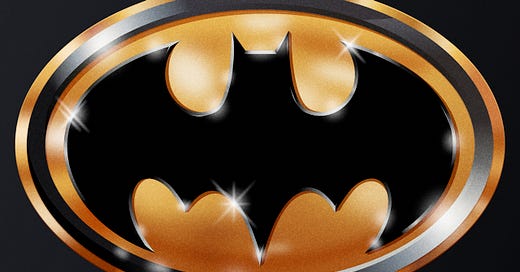



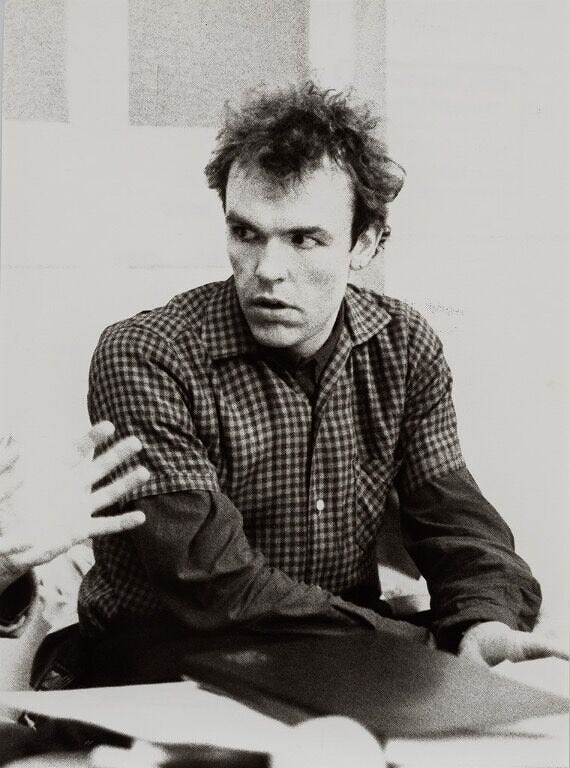
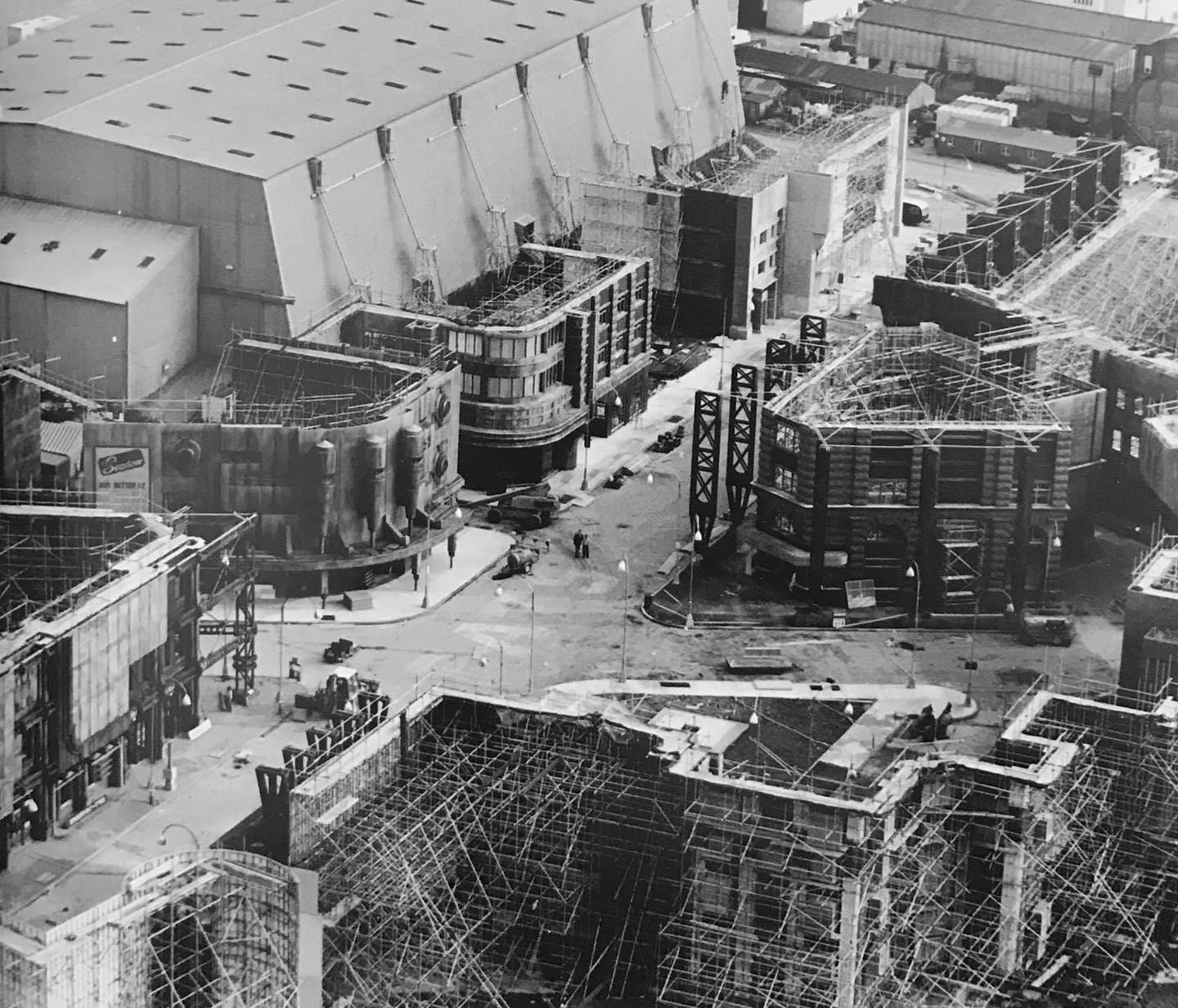

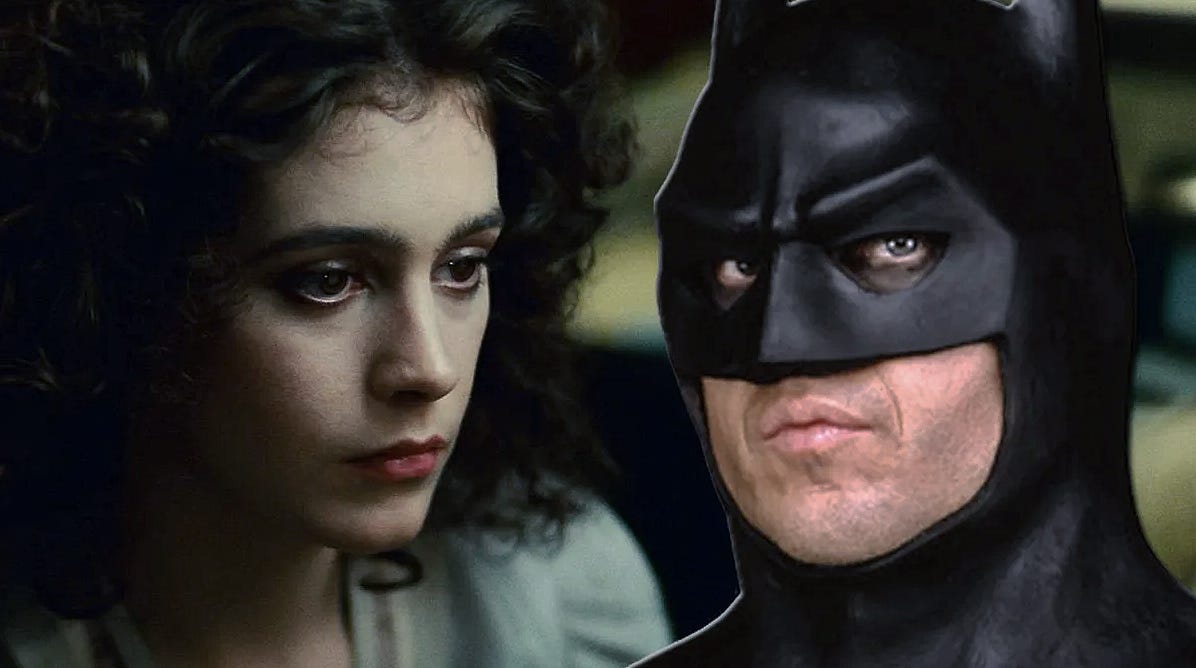
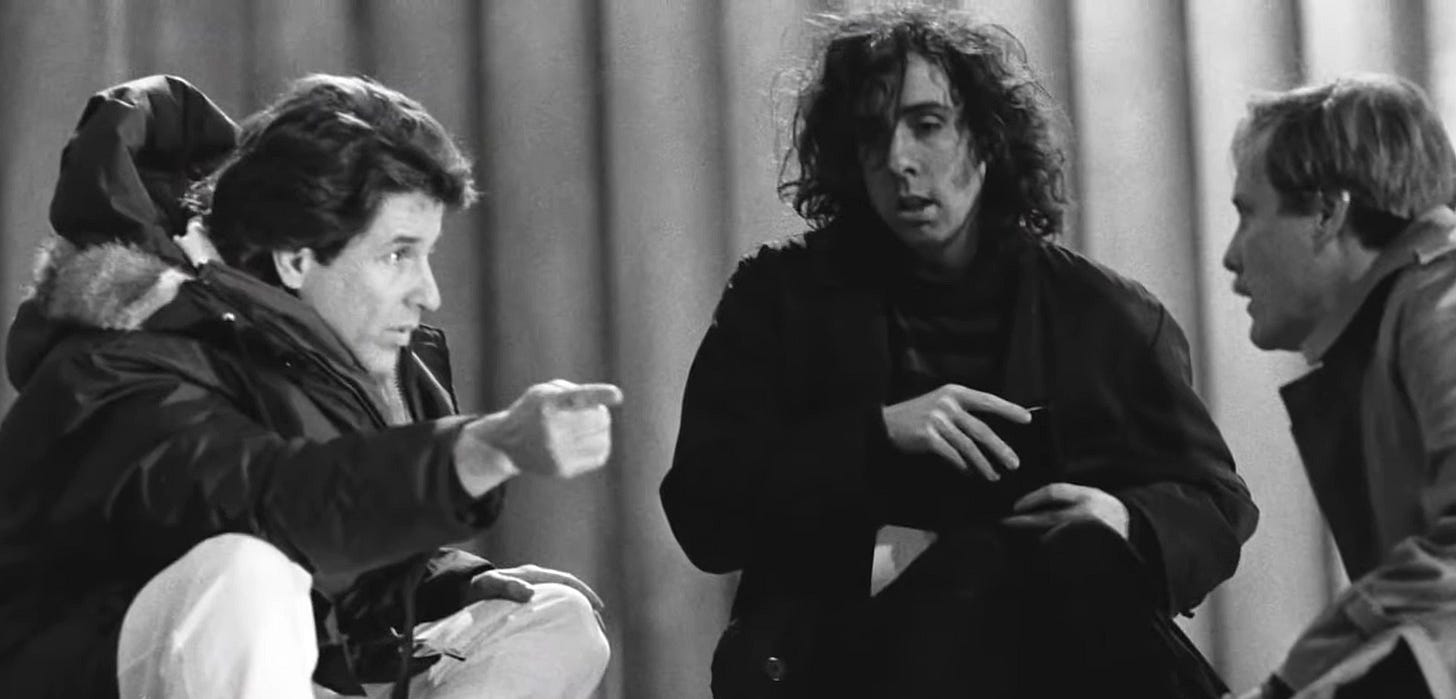

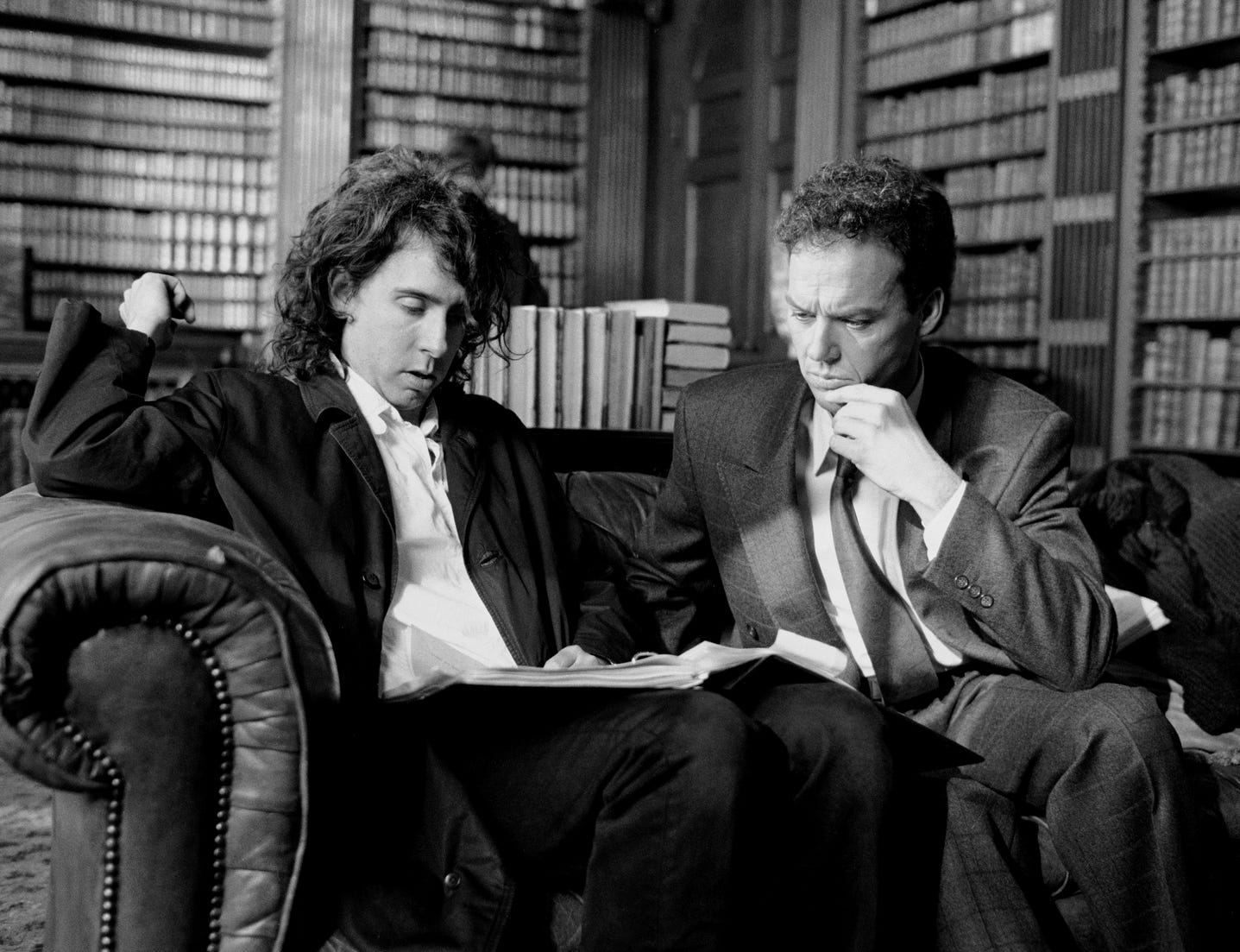

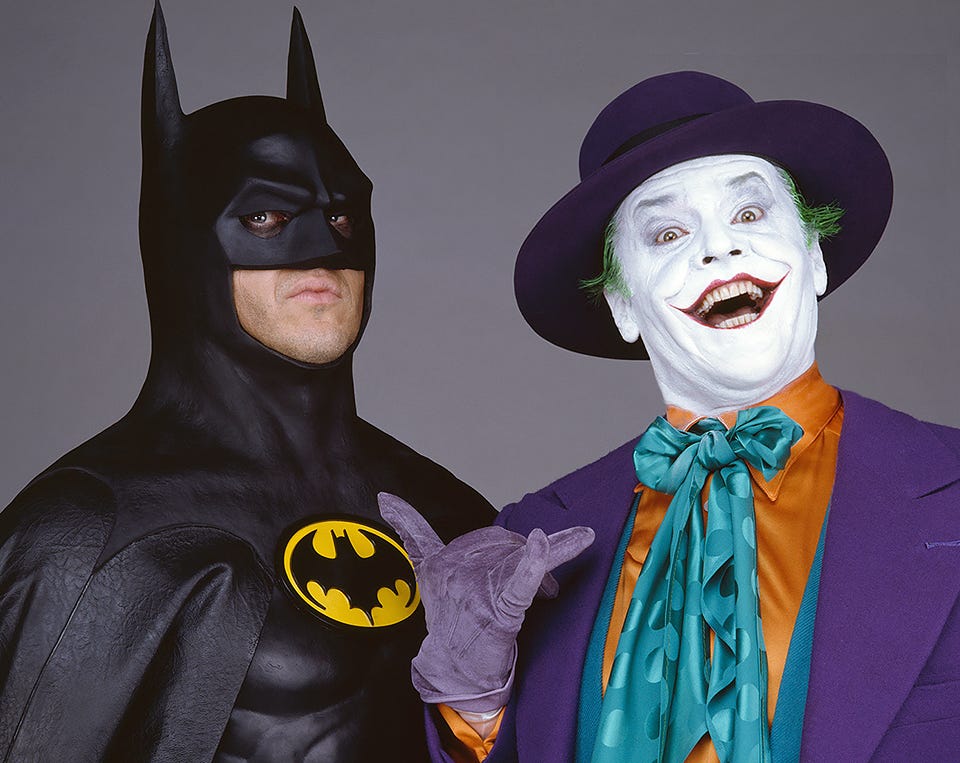


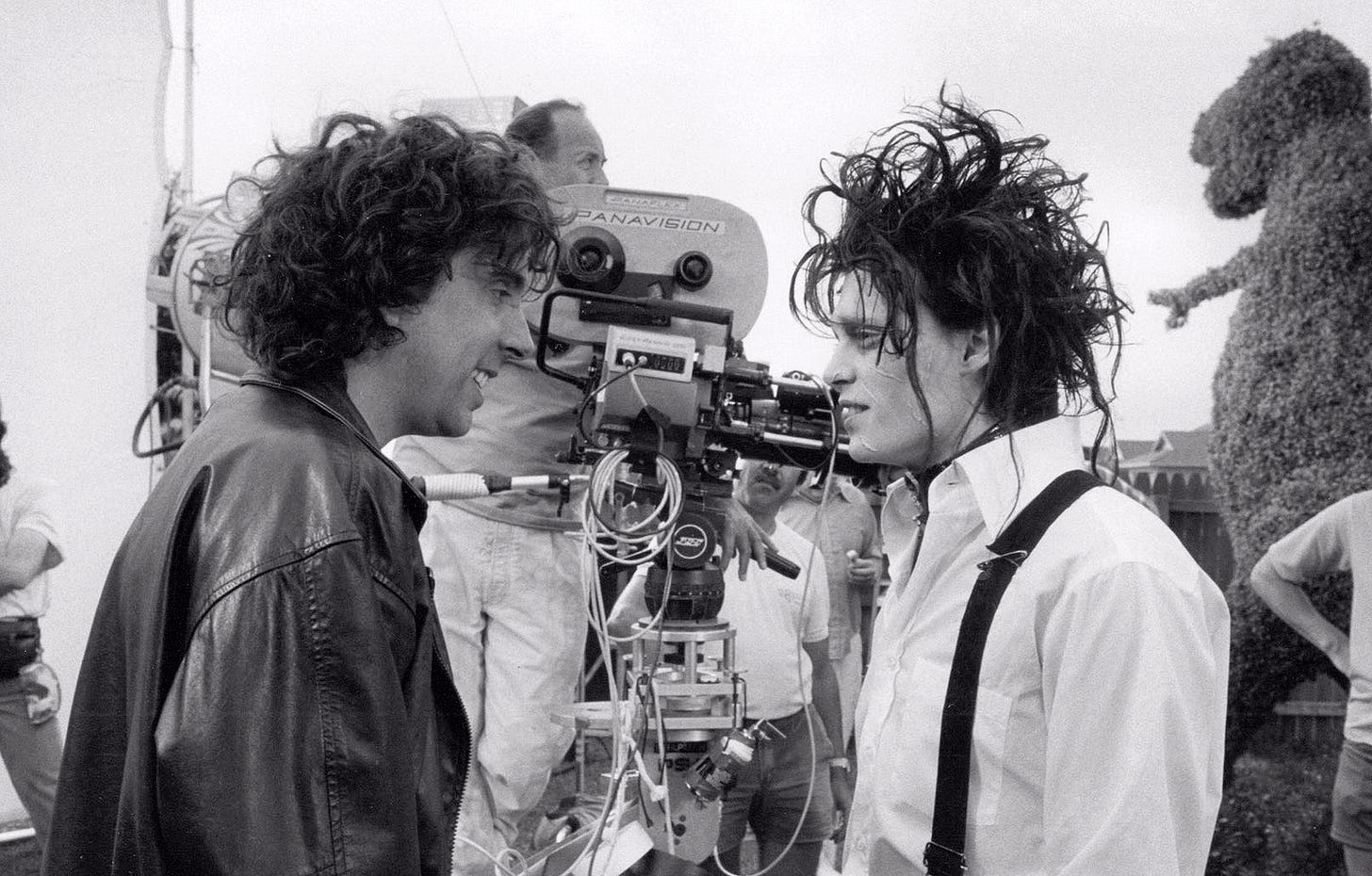

There's so much about the 1989 Batman here I did not know. And I do love the excellent long-form interview. style You are very empathetic as an interviewer, and your questions are in good taste without the tabloid. Batman's war on crime is primarily psychological, and that is why the first film works with Michael Keaton as a psychological Batman. I wonder who the other major contender was for the title role besides Mr. Keaton?
I never thought Alfred “just let Vicki in.” It’s clear she went there.
Was really surprised to hear that story about Jon Peters nearly being on the Lockerbie flight 🤯
Anyway loved all the insight, thank you and thanks to Jonathan 👍